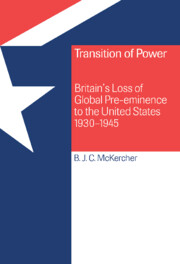Book contents
- Frontmatter
- Contents
- Acknowledgments
- List of abbreviations
- Prologue: Power and purpose in Anglo-American relations, 1919–1929
- 1 The end of Anglo-American naval rivalry, 1929–1930
- 2 The undermining of war debts and reparations, 1929–1932
- 3 Disarmament and security in Europe and the Far East, 1930–1932
- 4 The unravelling of co-operation, 1932–1933
- 5 Moving away from the United States, 1933–1934
- 6 Britain, the United States, and the global balance of power, 1934–1935
- 7 From Abyssinia to Brussels via London, Madrid, and Peking, 1935–1937
- 8 Appeasement, deterrence, and Anglo-American relations, 1938–1939
- 9 Belligerent Britain and the neutral United States, 1939–1941
- Epilogue: ‘A new order of things’, 1941–1945
- Select Bibliography
- Index
2 - The undermining of war debts and reparations, 1929–1932
Published online by Cambridge University Press: 15 July 2009
- Frontmatter
- Contents
- Acknowledgments
- List of abbreviations
- Prologue: Power and purpose in Anglo-American relations, 1919–1929
- 1 The end of Anglo-American naval rivalry, 1929–1930
- 2 The undermining of war debts and reparations, 1929–1932
- 3 Disarmament and security in Europe and the Far East, 1930–1932
- 4 The unravelling of co-operation, 1932–1933
- 5 Moving away from the United States, 1933–1934
- 6 Britain, the United States, and the global balance of power, 1934–1935
- 7 From Abyssinia to Brussels via London, Madrid, and Peking, 1935–1937
- 8 Appeasement, deterrence, and Anglo-American relations, 1938–1939
- 9 Belligerent Britain and the neutral United States, 1939–1941
- Epilogue: ‘A new order of things’, 1941–1945
- Select Bibliography
- Index
Summary
The fact is that France and America are both thinking of their forthcoming elections. Any Reparations settlement or adjustment must be accompanied by a corresponding settlement or adjustment of war debts. Hoover knows it but daren't say so.
Neville Chamberlain, December 1931In October 1929, as MacDonald completed his American trip, the New York Stock Market collapsed. Although indications of Wall Street's weakness had appeared six months before, it was the events of October that precipitated the ‘Great Depression’. The capitalist system by the 1920s was a delicate and interlocking structure in which any disruption spread quickly to all its parts. Supply and demand largely determined prices for most basic raw materials, food, and industrialised goods in the global marketplace; and regional division of labour had developed whereby large areas prospered by producing specific materials and goods for sale abroad. Credit financed much of this production, an arrangement based on mutual confidence: lenders and investors would get their funds back; debtors would pay; and producers of food, raw materials, and industrial products would be able to sell at fair prices. Through this process, sellers could purchase from primary and secondary producers, debts could be honoured, and new investment could be undertaken. To ensure smooth financial transactions, there was a stable medium of exchange. Gold underpinned the major currencies, particularly sterling and the dollar. Although London and New York banking houses contested for advantage, this competition occurred within defined rules and was overseen to a degree by co-operation between the Bank of England and the FRBNY.
- Type
- Chapter
- Information
- Transition of PowerBritain's Loss of Global Pre-eminence to the United States, 1930–1945, pp. 63 - 94Publisher: Cambridge University PressPrint publication year: 1999



